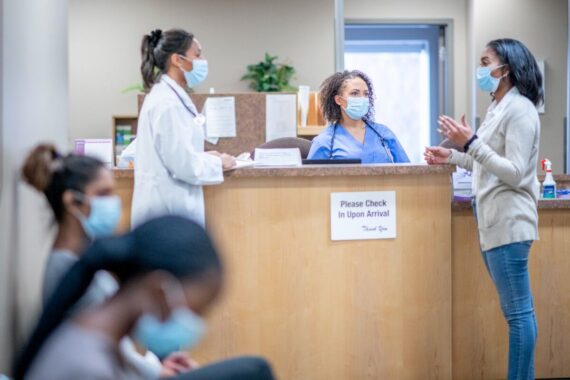GP practices in England delivered a record 36 million appointments last month, the latest NHS Digital data has shown.
This month, the dataset also includes the first-ever publication of controversial GP appointment data at practice level across the country, which from now on will form part of the monthly GP appointment dataset.
The data for October showed that practices in England delivered an estimated 36 million appointments – including around four million Covid vaccinations.
It is the highest number since NHS Digital began publishing the number of appointments including Covid jabs in December 2020.
It also included 22.8 million face-to-face appointments, which represented 71% of all appointments – the highest proportion of face-to-face appointments since February 2020, when 80% of appointments were delivered in person.
And GPs themselves delivered 14.2 million appointments last month.
Meanwhile, a controversial new practice-level dataset was today published for the first time showing how many appointments each GP practice is offering and the waiting times for these.
Health secretary Steve Barclay said: ‘We promised to prioritise patients and improve access and that is exactly what we have done – and this is just the start.
‘I am determined to make it easier for people to get an appointment with their GP practice when they need one and this will allow patients to make a more informed choice about the care they receive.’
But BMA GP Committee for England deputy chair Dr Kieran Sharrock warned that the new data does not take ‘nuances’ such as patient choice and the size and age of the practice population into account.
He said: ‘Rather than this being a useful tool to aid patient choice, it is really no more than a way to “name and shame” practices when the morale of dedicated staff is at rock bottom.
‘Ultimately, such data should be used to support, not punish practices.’
He added: ‘If the Government was serious about improving access to general practice it would address the huge shortfall in doctors, rather than simply piling more pressure and expectation on to the ones that we already have and so desperately need to hang on to.’
RCGP chair Professor Kamila Hawthorne said: ‘It’s disappointing that the hard work of GP teams, working in incredibly difficult circumstances, is being overshadowed by the publication of practice-level data allowing arbitrary comparisons between practices.
‘Instead of focusing on publishing data that undermines the hard work of GP teams, singling out and demoralising practices that are potentially struggling most, the Government should focus on addressing the root cause of the unrelenting workload and workforce pressures GPs and our teams are working under and support them to deliver high-quality and safe patient care.’
She added: ‘Today’s figures show GPs and their teams delivered a record 36.1 million consultations in October, almost 40% of these on the day they were booked and more than 71% delivered in-person, the highest proportion since before the pandemic.
‘This shows how hard GPs and their teams are working to deliver increasingly complex care to the growing number of patients, against a backdrop of severe workforce shortages.’
NHS Digital GP workforce figures, also published today, revealed that the number of fully-qualified full-time equivalent GPs has fallen by nearly 1,900 since September 2015 and by 713 since 2019, when the Government promised 6,000 more GPs by 2024.
The new practice-level appointment data
According to the BMA, NHS Digital had apparently admitted that more work was needed ahead of the launch of the ‘experimental’ data this week.
The BMA said it has raised concerns about the ‘accuracy of the data and its potential use’ with NHS Digital.
Earlier this month, it was revealed that plans to publish appointment data for each practice in England from this month would go ahead on 24 November.
The plans were originally put forward by former health secretary Dr Thérèse Coffey, but they were not axed by her successor Steve Barclay following a political reshuffle.
While the data was today published as an annexe to the current GP appointments data publication, this will be updated for April 2023 to integrate the practice-level data into the main report.
There will also be a ‘dashboard’ of appointment data at a practice level that will be available for integrated care boards (ICBs) to access, the GPC has said.
The Government has also indicated that the ‘expectation’ set by Dr Coffey that GP practices offer non-urgent appointments to patients within two weeks, as well as same-day urgent appointments, also remains in place.
But the former health secretary previously indicated that the only repercussion for practices that do not meet the expectations would be the potential of patients switching GP.
NHS England has said that while it is ‘reasonable’ for patients to expect to see a GP within two weeks, delivering this is currently impossible.
Pulse October survey
Take our July 2025 survey to potentially win £1.000 worth of tokens














Wow.
1 million IBS consultations
1 million coughs that didn’t cough
1 million panic attacks and I’ve got ADHD
1 million dry nothing rashes
1 million well children
1 million just here to chat about er, my fake cancer?
1 million lumps that aren’t there now
Wow.
Thank you very much for sharing, I learned a lot from your article. Very cool. Thanks.